

Centro de Investigación en Matemáticas (CIMAT) Universidad de Guanajuato (UG)
3 - 7 November, 2025
Guanajuato, Guanajuato, Mexico
On-Site


Centro de Investigación en Matemáticas (CIMAT) |
Universidad de Guanajuato (UG)
3 - 7 November, 2025
Guanajuato, Guanajuato, Mexico
On-Site

ABOUT US
Remember with us MICAI 2024
Discover the highlights from the 23rd edition of MICAI, organized in 2024 by SMIA in collaboration with INAOE and UDLAP.
The Mexican International Conference on Artificial Intelligence (MICAI) is a yearly international conference series that has been organized by the Mexican Society for Artificial Intelligence (SMIA) since 2000. MICAI is a major international artificial intelligence (AI) forum and the main event in the academic life of the country’s growing AI community. This year, the conference will jointly take place at Centro de Investigaciones en Matemáticas (CIMAT) and Universidad de Guanajuato (UG).
MICAI is recognized by Springer as a premier international conference in the field of Artificial Intelligence. This high-level, peer-reviewed event brings together researchers, practitioners, and industry professionals from around the world to explore advances across all areas of AI. As artificial intelligence has grown in relevance in recent years, MICAI has strengthened collaborations with industry, governmental bodies, as well as international agencies and policymakers, and other actors of the ecosystem. The conference has featured industry panels and roundtables, invited stakeholders to give tutorials and more recently, introduced an industry-focused applied AI workshop within the conference.
The conference, as is traditional, showcases a large variety of research fields and topics. Moreover, the conference includes cutting-edge keynote lectures, as well as detailed paper and poster presentations. The first two days are dedicated to specialized workshops, comprehensive hands-on tutorials, AI competitions, and a doctoral consortium. Furthermore, thought-provoking panels provide a rich and exciting experience during the conference, which aim to cater to a wide audience. Moreover, we will continue the legacy of announcing the José Negrete Awards, the SMIA Best Thesis in Artificial Intelligence Contest’s results.
The proceedings of MICAI have been historically published in two different Springer volumes, Advances in Computational Intelligence and Advances in Soft Computing. The areas of interest include, but are not limited to all areas of Artificial Intelligence, Computational Intelligence, Machine Learning, Data Mining, Fuzzy Systems, research or applications.
About MICAI
Mexican International Conference
on Artificial Intelligence - MICAI
The Mexican International Conference on Artificial Intelligence (MICAI) is the leading AI event in Mexico, organized by the Mexican Society for Artificial Intelligence (SMIA) since 2000. It brings together researchers, students, professionals, and industry experts from around the world to share advances in AI, machine learning, data science, and more.
MICAI 2025 is organized by the Centro de Investigación en Matemáticas (CIMAT) and the Universidad de Guanajuato.
The conference will be held at the División de Ciencias Económico-Administrativas (DCEA) in Guanajuato City, Mexico. Guanajuato’s historic city center, recognized as a UNESCO World Heritage Site, offers a vibrant cultural setting for exchange and collaboration.
The event features keynote talks, tutorials, workshops, competitions, panels, and the José Negrete Award for the best AI thesis, providing a platform for both academic exchange and practical innovation.
With Springer publications and strong collaborations with academia, industry, and government, MICAI is a global reference in the AI field.
VENUE
División de Ciencias Económico-Administrativas (DCEA)
Fraccionamiento 1, Col. El Establo S/N C.P. 36250, Guanajuato, Gto., México


VICENTE ORDOÑEZ
"The Multimodal Frontier: Challenges and Opportunities in the New Era of AI"
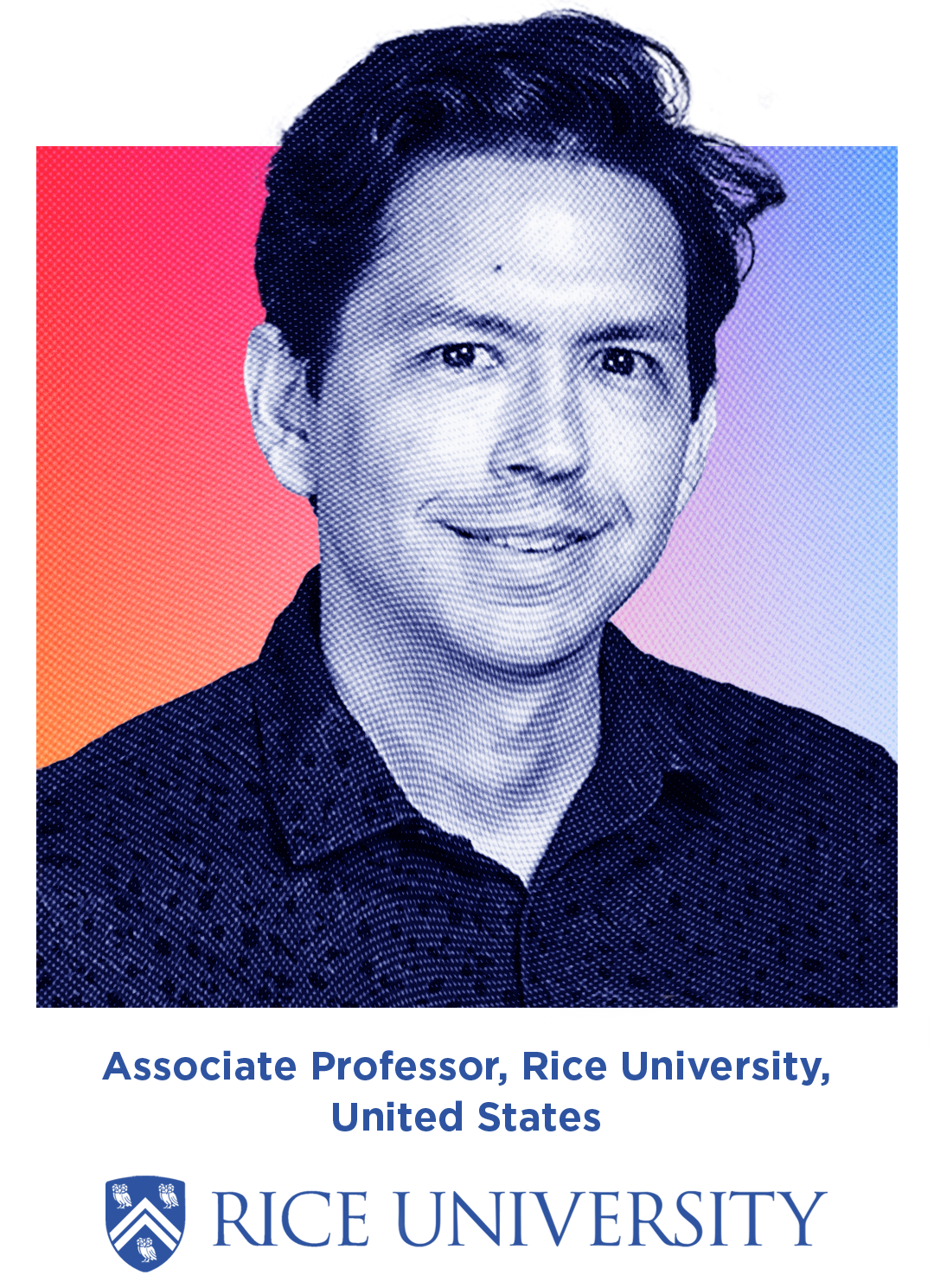
- Expert on large multimodal models
- Recipient of the US National Science Foundation CAREER Award (2021)
- Winner of the IEEE Marr Prize in fundamental computer vision
About the Talk:
The aim of artificial intelligence has moved from mastering single domains to achieving a holistic understanding of our world. This new era is defined by multimodality—the ability to reason coherently across images, text, sound, and video. In this keynote, I will explore this frontier, contextualizing major breakthroughs and identifying critical obstacles to real-world impact. Drawing on research from our research group at Rice University, I will delve into specific solutions, including: Anchoring Language in Reality, Learning from Less, and From Understanding to Creating. Finally, I will argue that efficiency—in data, computation, deployment and human-AI interaction — are important factors to unlock the transformative potential of multimodal AI, moving it from the laboratory to our daily lives.
Bio:
Vicente Ordóñez is an associate professor in computer science at Rice University where he directs the Vision, Language and Learning Lab. He is also a member of the Ken Kennedy Institute where he leads a research cluster on computer vision. His work is at the intersection of computer vision, machine learning and natural language processing and explores developing artificial intelligence models from multimodal data. He has received the Marr Prize — Best Paper Award — at the International Conference on Computer Vision (ICCV) and a Best Paper Award at the Conference on Empirical Methods in Natural Language Processing (EMNLP). His experience includes visiting and part time appointments at the Allen Institute for Artificial Intelligence, Adobe Research, and the Amazon Alexa AI and Amazon AGI Foundations teams. His research has been funded by the US National Science Foundation, and gifts from Google, IBM, Facebook, Salesforce, SAP, Amazon, Adobe, Snapchat, among others. Vicente holds a PhD in computer science from the University of North Carolina at Chapel Hill, an MS in computer science from Stony Brook University and an engineering degree from the Escuela Superior Politécnica del Litoral in Ecuador.

Stephen Smith
"Smart Infrastructure for Future Urban Mobility"
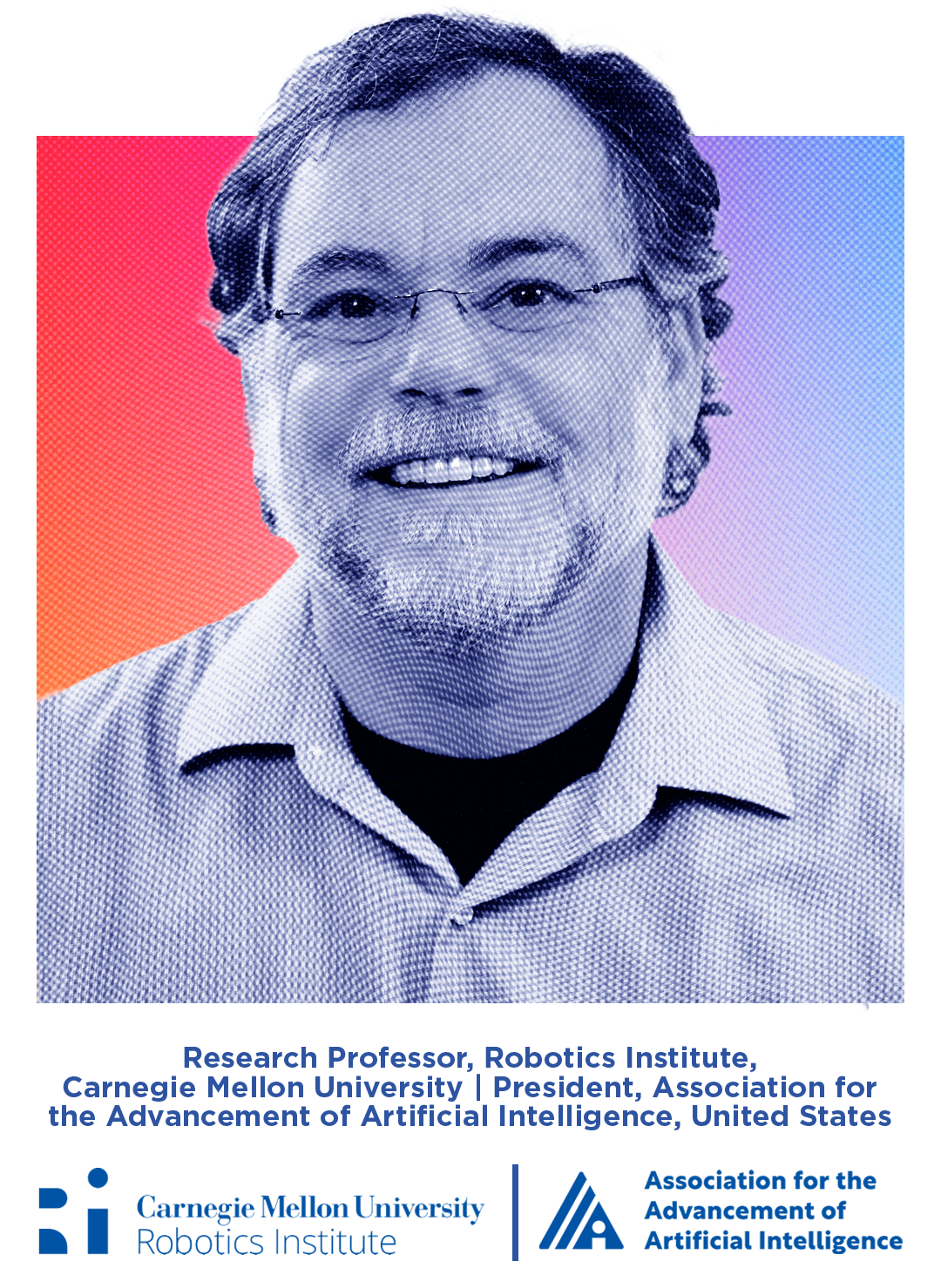
- Pioneer in constraint-based planning and scheduling
- Inventor of real-world urban traffic systems
- President of the Association for the Advancement of Artificial Intelligence
About the Talk:
Real-time traffic signal control presents a challenging multi-agent planning problem, particularly in urban road networks where there are competing dominant traffic flows that shift through the day. Further complicating matters, urban environments require attention to multi-modal traffic flows (vehicles, pedestrians, bicyclists, buses, etc.) that move at different speeds and may be given different priorities. In our research group, we propose Surtrac, a real-time, decentralized adaptive signal control system that optimizes the flow of actual traffic rather than relying on historical predictions, which has now been deployed in over 40 North American cities. The system has been improved over the years, and this talk will summarize this overall research effort and discuss the open research challenges that remain.
Bio:
Stephen F. Smith is a Research Professor of Robotics at Carnegie Mellon University, where he heads the Intelligent Coordination and Logistics Laboratory. Smith’s research focuses broadly on the theory and practice of next-generation technologies for automated planning, scheduling, and control of large multi-actor systems. He pioneered the development and use of constraint-based search and optimization models for solving planning and scheduling problems and has successfully fielded AI-based planning and scheduling systems in a range of application domains. One principal application focus for many years now has been urban mobility and smart transportation infrastructure. His work on smart traffic signals, which combines concepts from artificial intelligence and traffic theory, led to development of Surtrac – an innovative decentralized system for real-time urban traffic signal control that is now deployed in over 40 North American cities. Smith has published over 325 technical papers in the areas of automated planning and scheduling, search-based optimization, multiagent systems and machine learning, and he has received numerous research and best paper awards. He is a Fellow of the Association for the Advancement of Artificial Intelligence (AAAI) and in February 2025 became AAAI President.

Humberto Sossa
"Why neural networks are such a powerful tool"

- Recipient of the National Computing Award (2021)
- Promotor of intelligent robotics
- Former President of the Mexican Society for Artificial Intelligence
About the Talk:
Artificial neural networks have become a very useful tool in recent years for solving problems of all kinds. Advances in this field have been driven, on the one hand, by a better understanding of their operation. On the other hand, by the consolidation of the development of processors that enable associated learning algorithms. In this talk, after an introduction, we will explore a set of concepts related to artificial neural networks as operational models of biological brains. We will then explain why artificial neural networks are such a powerful tool today.
Bio:
Humberto Sossa holds a Ph.D. in Computer Science from the National Polytechnic Institute of Grenoble, France. He is a full professor at the National Polytechnic Institute and Director of the Center for Computing Research. He is an Emeritus Member of the National System of Researchers. He is a member of the Mexican Academy of Sciences and a member of the Academy of Engineering. He is also a Senior Member of the Institute of Electrical and Electronics Engineers (IEEE) and the International Society for Neural Networks (INNS). He is a member of the Academy of Computing Machinery (ACM) and a Fellow of the Mexican Society of Artificial Intelligence (SMIA). In 2021, he was awarded the National Computing Prize by the Mexican Academy of Computing (AMEXCOMP). In 2023, he received the Research Award at the National Polytechnic Institute in the area of basic research. In 2024, he received an Honorary Doctorate from the Technological Institute of Ecatepec. He is the author of five textbooks, 13 patents, 32 copyrights, and over 500 conference and journal papers. He has given over 560 invited talks. His research interests include Artificial Intelligence, Machine Learning, Artificial Neural Networks, Image Analysis, Pattern Recognition, Robotics, and Metaverses.

ISABELLE GUYON
"The Role of AI in Scientific Peer Review"
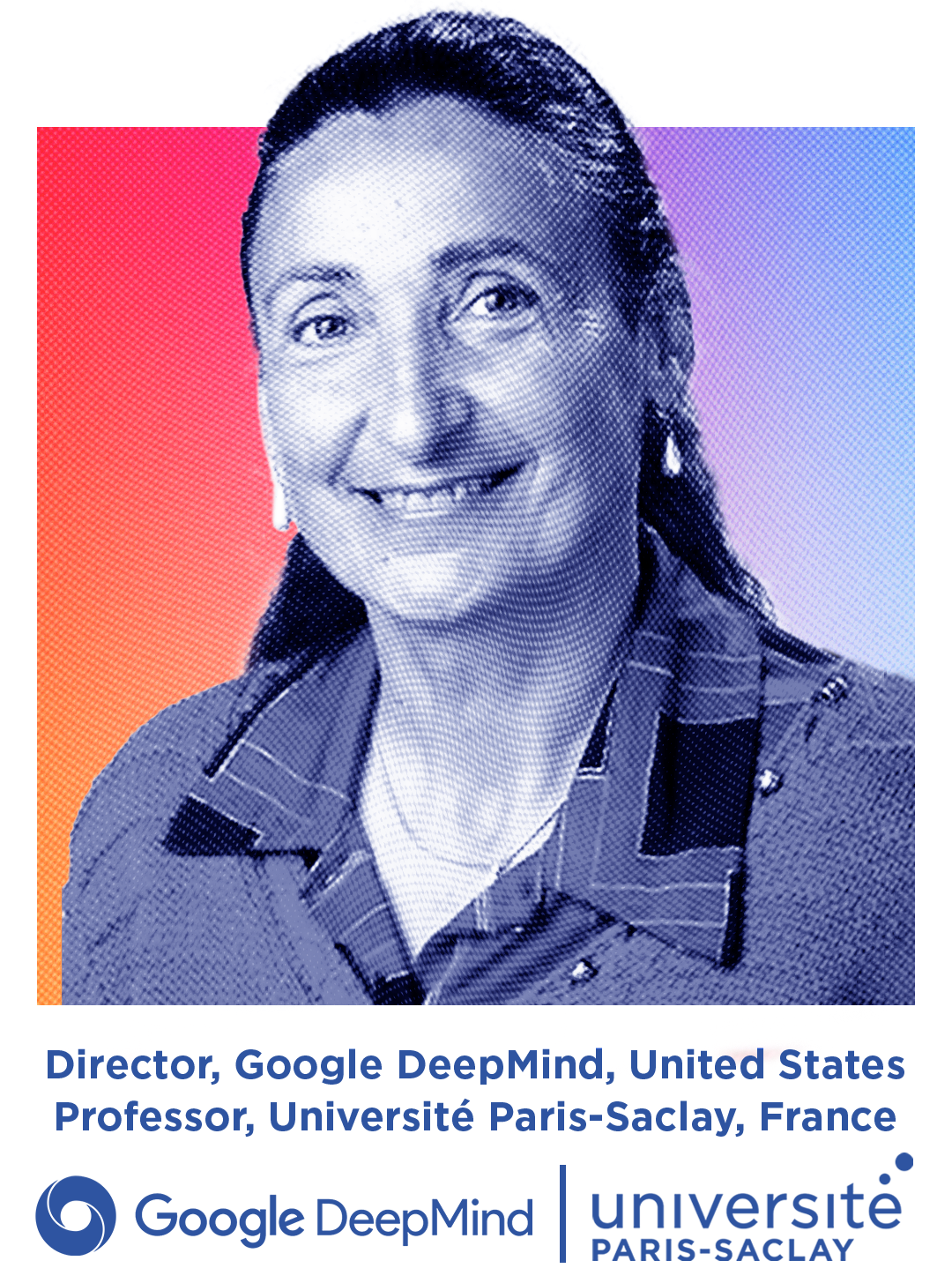
- Co-inventor of Support Vector Machines (SVM)
- Contributor of feature selection algorithms
- Recipient of the BBVA Foundation Frontiers of Knowledge Award (2020)
About the Talk:
One of the pillars of scientific progress, the peer review system, is facing unprecedented challenges. The pressure to publish, coupled with the lack of adequate incentives for reviewers, the sheer volume of submissions, and the difficulties in finding relevant expertise, are pushing the system towards a breaking point. The rise of sophisticated language models (LLMs) has added another layer of complexity, exacerbating the problem by facilitating the generation of potentially low-quality or even fabricated content. However, these very same technological advancements promise to improve the peer review process. In this presentation, we will review recent progress in this area.
Bio:
Isabelle Guyon is Director, Research Scientist at Google, in detachment from her position as professor of Artificial Intelligence at Université Paris-Saclay (Orsay). She specializes in data-centric AI, statistical data analysis, pattern recognition, and machine learning. Her areas of expertise include computer vision, bioinformatics, and power systems. Her recent interests include meta-learning, causal discovery, AI fairness and safety, and Generative AI. Prior to joining Paris-Saclay she worked as an independent consultant and was a researcher at AT&T Bell Laboratories, where she pioneered applications of neural networks to pen computer interfaces (with collaborators including Yann LeCun and Yoshua Bengio) and co-invented with Bernhard Boser and Vladimir Vapnik Support Vector Machines (SVM), which became a textbook machine learning method. She is also the primary inventor of SVM-RFE, a variable selection technique based on SVM. The SVM-RFE paper has thousands of citations and is often used as a reference method against which new feature selection methods are benchmarked. She also authored a seminal paper on feature selection that received thousands of citations. She organized many challenges in Machine Learning since 2003 supported by the EU network Pascal2, NSF, DARPA, and the European Commission, with prizes sponsored by Microsoft, Google, Facebook, Amazon, Disney Research, and Texas Instrument. Isabelle Guyon holds a Ph.D. degree in Physical Sciences of the University Pierre and Marie Curie, Paris, France. She is president of Chalearn, a non-profit dedicated to organizing challenges, action editor of the Journal of Machine Learning Research, editor of the Springer series of Challenges in Machine Learning, and served as program co-chair of NIPS 2016, general co-chair of NIPS 2017, and NeurIPS board member 2018-2024. She serves on the board of Kaggle. She is a 2020 recipient of the BBVA Frontiers in Research Award together with Prof. Schoelkopf and Prof. Vapnik and a member of the French Academy of technologies since 2024.

Lydia Kavraki
"Robotics, AI, and the Quest for Human-Centered Autonomous Systems"
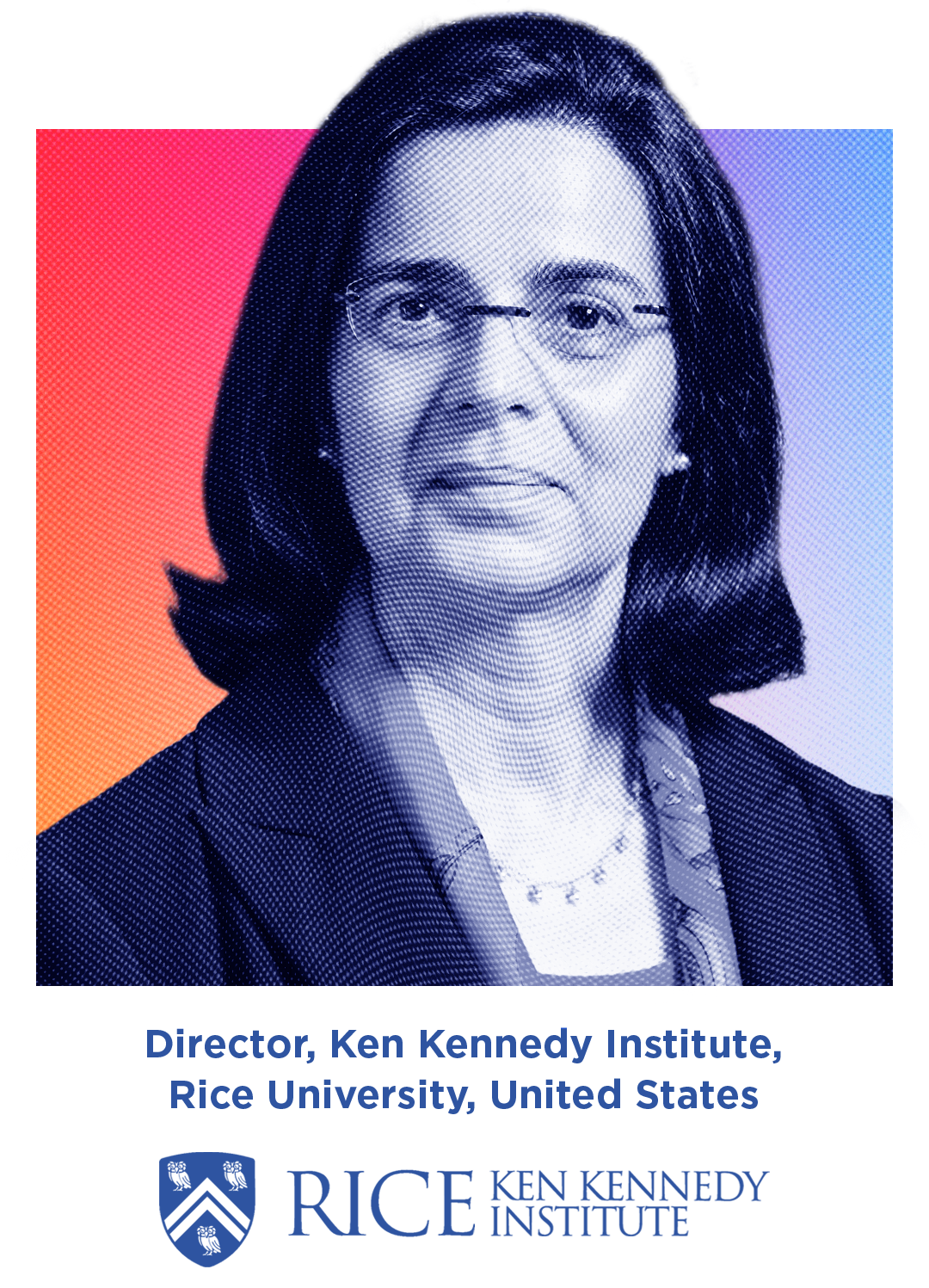
- Inventor of the Probabilistic Roadmap Method (PRM)
- Bridges robotics and biomedical discovery
- Recipient of the IEEE Robotics Pioneer Award (2020)
About the Talk:
Spurred by advances over the last sixty years, robots are no longer confined to factories; they are increasingly integrated into human environments, collaborating closely with people on a diverse range of tasks. As these systems evolve to tackle even more complex roles, a multitude of theoretical and practical challenges arise to ensure their reliability and performance. This talk will delve into the intricacies of developing human-centered robotic systems, placing particular emphasis on the computational underpinnings of motion planning.
Bio:
Lydia E. Kavraki is the Kenneth and Audrey Kennedy Professor of Computing and professor of Computer Science and Bioengineering at Rice University. She is also the Director of the Ken Kennedy Institute for AI and Computing. Kavraki’s research develops the AI and the algorithmics needed to connect the digital to the physical world. She has two main areas of application for her research. In robotics, she develops methodologies for motion planning, machine learning methods for reasoning under uncertainty, and multi-modal frameworks to instruct robots and collaborate with them. In computational biomedicine, she develops AI methods for understanding biomolecular interactions and aiding the design of new therapeutics. Kavraki is a member of the National Academy of Engineering, the National Academy of Sciences, the National Academy of Medicine, and the American Academy of Arts and Sciences. She is the recipient of the IEEE Robotics and Automation Society Pioneer Award and the IEEE Frances E. Allen Medal.
Meet Our
KEYNOTE SPEAKERS
REGISTRATION
Early bird rates apply for Full Conference until September 19, 2025. For Workshops until October 17, 2025. Details of each package are outlined below.
Change currency
- Prices include taxes.
- Payment from abroad may require bank fees.
Non-Authors
Full Conference
November 3 – 7
| Type | Before Sep 19Early Bird | After Sep 19Later |
|---|---|---|
| SMIA Member | $ 750 | $ 1,000 |
| Student | $ 500 | $ 600 |
| Professional | $ 1,000 | $ 1,500 |
| Type | Before Sep 19Early Bird | After Sep 19Later |
|---|---|---|
| SMIA Member | $ 45 | $ 60 |
| Student | $ 30 | $ 36 |
| Professional | $ 60 | $ 90 |
Includes:
- Workshops
- Tutorials
- Doctoral Consortium
- Keynote talks
- Panels
- Parallel presentation sessions
- Poster session
- Welcome cocktail
- Hosted coffee during breaks
Accepted Authors
Full Conference
November 3 – 7
| Type | Before Sep 19Early Bird | After Sep 19Later |
|---|---|---|
| SMIA Member | $ 9,500 | $ 10,500 |
| Regular | $ 10,500 | $ 11,500 |
| Type | Before Sep 19Early Bird | After Sep 19Later |
|---|---|---|
| SMIA Member | $ 570 | $ 630 |
| Regular | $ 630 | $ 690 |
Includes:
- Publication fee for 1 paper
- 1 SMIA Membership*
- Workshops
- Tutorials
- Doctoral Consortium
- Keynote talks
- Panels
- Parallel presentation sessions
- Poster session
- Welcome kit
- Welcome cocktail
- Hosted coffee during breaks
- 1 Gala dinner seat (Previous registration required)
*For one author, valid starting November 2025
Accepted Authors
Workshops Only
November 3 – 4
| Type | Before Oct 17Early Bird | After Oct 17Later |
|---|---|---|
| SMIA Member | $ 4,500 | $ 6,500 |
| Regular | $ 5,000 | $ 7,000 |
| Type | Before Oct 17Early Bird | After Oct 17Later |
|---|---|---|
| SMIA Member | $ 270 | $ 390 |
| Regular | $ 300 | $ 420 |
Includes:
- Publication fee for 1 paper
- Workshops
- Tutorials
- Doctoral Consortium
- Hosted coffee during breaks
- Welcome kit
Optional extra items
| Type | Cost |
|---|---|
| Gala Dinner Seat* | TBA |
| Publication extra page** | $ 250 |
| Type | Cost |
|---|---|
| Gala Dinner Seat* | TBA |
| Publication extra page** | $ 15 |
*Gala dinner seat (optional, extra per person)
** Publication fee for extra page (if the paper has more than 12 pages)
ACTIVITIES
Dive into the Action
Panels, tutorials, workshops and more. Explore the full program and make the most of your MICAI experience. Connect, learn, and be part of the future of AI.
National Thesis Award
SMIA invites master’s and doctoral graduates to participate in the José Negrete Award, which recognizes the best AI theses developed at Mexican institutions.
It’s a great opportunity to share your work and stand out in the national artificial intelligence community.
Calls
View current calls for papers, workshops, tutorials, doctoral consortium and participation.
Venue & Travel
Find essential information about the conference venue, travel logistics, and accommodations in Guanajuato. Get all the details on how to attend MICAI.

CHAIRS
- Claudia Gonzalez, Publicity Chair | Instituto Tecnológico de Tijuana
- Bella Martínez, Publicity Chair | Instituto Politécnico Nacional
- Hugo Jair Escalante, Plenary Chair | INAOE
- David Pinto, Tutorial Chair | Benemérita Universidad Autónoma de Puebla
- Iris Mendez, Workshop Chair | Universidad Autónoma de Ciudad Juárez
- Hiram Ponce, Publication Chair | Universidad Panamericana
- Gilberto Ochoa, Panel Chair | Tecnológico de Monterrey
- Jorge Alberto Soria Alcaraz, Logistics Local Chair | Universidad de Guanajuato
- Marco Aurelio Sotelo Figueroa, Logistics Local Chair | Universidad de Guanajuato
PROGRAM COMMITTEE
• Alberto Ochoa-Zezzatti
• Aldo Marquez-Grajales
• Alexander Bozhenyuk
• Andrés Espinal
• Angel Sánchez García
• Anilu Franco
• Antonieta Martinez
• Antonio Neme
• Ari Barrera Animas
• Asdrúbal López Chau
• Belém Priego Sánchez
• Bella Martinez Seis
• Betania Hernandez-Ocaña
• Claudia Gómez
• Daniela Alejandra Ochoa
• Dante Mújica-Vargas
• Diego Uribe
• Eddy Sánchez-DelaCruz
• Eduardo Valdez
• Efrén Mezura-Montes
• Eloísa García-Canseco
• Elva Lilia Reynoso Jardon
• Eric Tellez
• Ernesto Moya-Albor
• Félix Castro Espinoza
• Fernando Gudino
• Garibaldi Pineda Garcia
• Genoveva Vargas-Solar
• Gilberto Ochoa-Ruiz
• Giner Alor-Hernandez
• Guillermo Santamaría-Bonfil
• Gustavo Arroyo
• Helena Gómez Adorno
• Hiram Ponce
• Hiram Calvo
• Hugo Jair Escalante
• Humberto Sossa
• Iris Iddaly Méndez-Gurrola
• Iskander Akhmetov
• Ismael Osuna-Galán
• Israel Tabarez
• Jaime Cerda
• Jerusa Marchi
• Joanna Alvarado Uribe
• Jorge Perez Gonzalez
• José Alanis
• José Martínez-Carranza
• José Alberto Hernández-Aguilar
• José Carlos Ortiz-Bayliss
• Juan Villegas-Cortez
• Juan Carlos Olivares Rojas
• Karina Perez-Daniel
• Karina Figueroa Mora
• Leticia Flores Pulido
• Lourdes Martínez-Villaseñor
• Luis Torres-Treviño
• Luis Luevano
• Mansoor Ali Teevno
• Masaki Murata
• Miguel Gonzalez-Mendoza
• Miguel Mora-Gonzalez
• Mukesh Prasad
• Omar López-Ortega
• Rafael Guzman-Cabrera
• Rafael Batres
• Ramon Brena
• Ramón Zatarain Cabada
• Ramón Iván Barraza-Castillo
• Roberto Antonio Vasquez
• Rocio Ochoa-Montiel
• Ruben Carino-Escobar
• Sabino Miranda
• Saturnino Job Morales
• Segun Aroyehun
• Sofía Galicia Haro
• Tania Ramirez-del Real
• Vadim Borisov
• Valery Solovyev
• Vicenc Puig
• Vicente Garcia Jimenez
• Victor Lomas-Barrie
Important Dates & Deadlines
7 July, 2025, end of day, AoE |
Regular papers submission deadline |
| 6 August, 2025 | Notification of acceptance |
| 20 August, 2025 | Camera-ready submission |
| 19 September, 2025 | Full Conference: Early bird registration |
| 17 October, 2025 | Workshop: Early bird registration |
| 31 October, 2025 | Payment and registration deadline |
| 3–7 November, 2025 | Conference |
Sponsors









